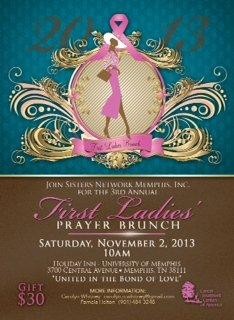
The Memphis chapter of Sisters Network, a national organization composed of African-American breast cancer survivors, is hosting its third annual “1st Ladies Prayer Brunch” this Saturday.
The prayer brunch will take place at the University of Memphis Holiday Inn (3700 Central Ave.) Saturday, November 2nd. It will last from 10 a.m. to 2 p.m.
Well-known pastor Rev. Percy McCray, director of Pastoral Care for the Cancer Treatment Centers of America (CTCA), will be the keynote speaker at the brunch. McCray will share an inspirational message on the importance of patients and their families utilizing faith and spirituality when battling something as challenging as breast cancer.
The event will also feature a networking session, panel discussion, and an opportunity for attendees to participate in a question and answer session with medical experts. The overall objective of the prayer brunch is to encourage women to take their health more seriously and also embrace their relationship with God to help fight obstacles such as breast cancer.
In the U.S., more than 200,000 women are diagnosed with breast cancer each year, according to the American Cancer Society (ACS). In 2013, more than 27,000 African-American women are estimated to be diagnosed with breast cancer and over 6,000 of these women will succumb to it.
Although white women are diagnosed with breast cancer twice as much as African-American women, black women are 41 percent more likely to die from breast cancer, according to ACS. This is largely attributed to them being more susceptible to “triple negative breast cancer” (breast cancer not caused by the three usual receptors known to fuel most breast cancers: estrogen receptors, progesterone receptors, and human epidermal growth factor receptor 2). Black women are also statistically more likely to lack insurance coverage and less likely to undergo normal visits to the doctor for health screenings.
For more information on the prayer brunch, contact Sisters Network Memphis president Carolyn Whitney at (901) 789-7239 or visit sistersnetworkmemphis.org
Check out my website: ahumblesoul.com
Follow me on Twitter: @Lou4President
Friend me on Facebook: Louis Goggans